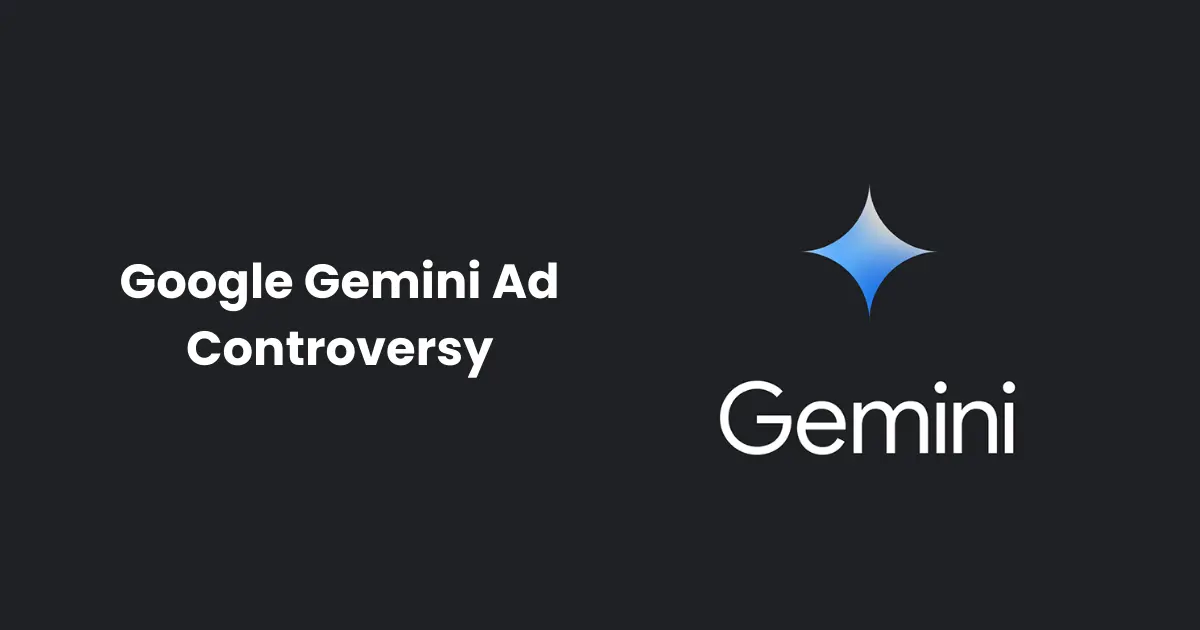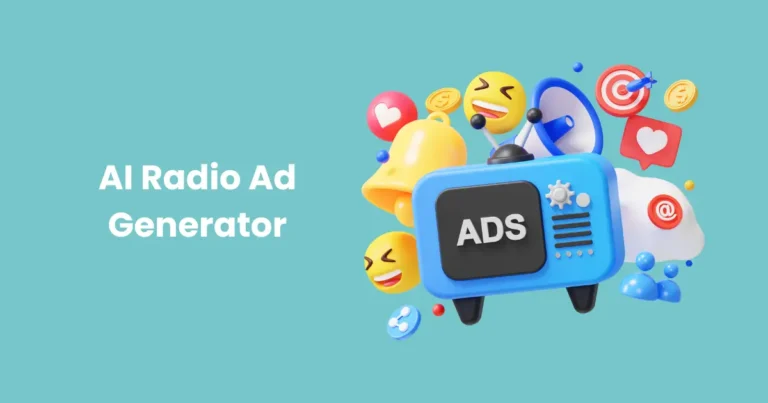Google Gemini Ad Controversy | Lesson for the future AI Marketing

Contents
The Google Gemini ad controversy has become a major topic of discussion in the digital marketing world, highlighting the complexities and potential pitfalls of AI-driven advertising. Google Gemini, an innovative advertising platform, was introduced as a groundbreaking tool that promises to revolutionize how advertisers target and engage consumers. However, recent issues with Gemini’s ad campaigns have raised serious concerns about its effectiveness and ethical implications. The controversy primarily stems from a series of misleading and inappropriate ads, which sparked backlash from users, advertisers, and critics alike. This article explores the Google Gemini ad controversy, examining its origins, the public’s response, and the broader impact on Google’s reputation and advertising practices.
What is Google Gemini?
Google Gemini is an advanced advertising platform developed by Google, leveraging artificial intelligence (AI) and machine learning to enhance the personalization and targeting of digital ads. It is designed to help advertisers reach specific audiences more effectively by analyzing vast amounts of data from Google’s ecosystem, including search history, browsing behavior, and user preferences. Gemini uses this data to deliver highly personalized ads that are tailored to individual users’ interests and needs, offering businesses a powerful tool to maximize their marketing efforts.
The platform combines the power of AI with Google’s rich data insights to create ads that adapt in real-time, improving relevance and engagement. Gemini is seen as a step forward in digital advertising, offering greater efficiency and precision for advertisers while providing users with more relevant content. However, despite its innovative features, the launch of Google Gemini has not been without controversy, particularly regarding the ethical implications of its ad targeting and the risks associated with AI-driven marketing.
The Google Gemini Ad Controversy
The Google Gemini ad controversy erupted when the platform’s AI-driven advertising system became embroiled in a series of incidents involving inappropriate, misleading, or controversial ads. While the Gemini platform was designed to revolutionize digital advertising by offering hyper-targeted and personalized campaigns, its algorithmic flaws led to a backlash from both consumers and advertisers. Here, we explore the key moments that triggered the controversy and the public’s response to these issues.

3.1 The Origin of the Controversy
The controversy surrounding Google Gemini began with a series of high-profile ad placements that were deemed offensive, misleading, or inappropriate. One notable incident occurred when the Gemini algorithm displayed an ad for a controversial political figure next to a popular children’s video, raising concerns about the platform’s ad placement controls. This incident quickly gained media attention and highlighted the potential dangers of AI-driven ad targeting, especially when the algorithm fails to differentiate between content that is appropriate and that which could be seen as harmful or disruptive.
Another controversy emerged when ads promoting harmful or fake products were mistakenly placed on trusted, high-traffic websites. These ads were often designed to look like legitimate news or product reviews, but they led consumers to questionable websites or malicious content. The combination of the high-profile nature of these ads and their widespread impact on users’ trust in Google’s advertising system fueled the controversy further.
These incidents exposed vulnerabilities in the Gemini platform and raised questions about the accountability of AI systems in advertising. Critics argued that the platform’s algorithm lacked the necessary safeguards to prevent harmful ad placements, leading to calls for greater transparency and oversight in how ads are targeted and displayed. As the controversy unfolded, many questioned whether Google was adequately prepared to manage the ethical implications of using such advanced technology in advertising.
Impact on Google’s Reputation
The Google Gemini ad controversy has had a significant impact on the company’s reputation, raising serious concerns about the effectiveness and ethical implications of its advertising platform. While Google has long been a trusted name in digital advertising, the backlash from the Gemini ad scandal has sparked discussions about the future of AI-driven marketing and the responsibility that tech companies bear in ensuring their technologies are used ethically.
4.1 Media Criticism
Media outlets quickly picked up on the controversy surrounding Google Gemini, with many criticizing the company for its failure to prevent problematic ads from being displayed. The backlash was particularly strong in the tech industry, where journalists and experts raised concerns about the dangers of relying too heavily on AI in advertising without sufficient human oversight. The media coverage painted a picture of a company that had rushed to launch an ambitious new platform without fully addressing its potential risks.
Reports highlighted how these issues could damage consumer trust, with some critics arguing that the problems with Gemini signaled a broader trend of irresponsible AI deployment across tech companies. The constant media scrutiny only fueled public outrage and left Google scrambling to reassure both consumers and advertisers that the issues would be addressed.
4.2 Consumer Trust Issues
One of the most significant repercussions of the Gemini ad controversy is the erosion of consumer trust in Google’s advertising practices. Many users felt uncomfortable with the idea of AI-driven algorithms making decisions about which ads they saw, especially when those ads were deemed inappropriate or misleading. In some cases, consumers even questioned Google’s commitment to privacy and safety, believing that the company was prioritizing profits over user well-being.
This trust deficit has been particularly damaging for Google, which has long positioned itself as a responsible and transparent company. The fallout from the controversy has led to calls for stronger regulatory frameworks and increased accountability, both for Google and other tech companies utilizing AI in advertising.
In response, Google has taken steps to address some of the concerns raised during the controversy, such as implementing stricter ad review processes and enhancing the transparency of its ad targeting algorithms. However, the controversy has left a lasting impact on the company’s reputation, reminding the public and regulators of the complex ethical issues associated with AI in advertising.
The Role of Advertising in Google’s Business Model
Advertising is at the core of Google’s business model, generating the vast majority of the company’s revenue. As one of the largest digital advertising platforms in the world, Google has built a multi-billion-dollar business on the ability to connect advertisers with targeted audiences through its search engine, YouTube, Google Display Network, and other services. The Google Gemini ad controversy, however, has raised important questions about the role advertising plays in the company’s operations and the potential risks of over-relying on AI-powered advertising systems.

Advertising Revenue as the Backbone
Google’s advertising business is predominantly powered by its Google Ads platform, which enables businesses of all sizes to create targeted ads that appear across Google’s vast network. The company’s dominance in digital advertising comes from its ability to leverage data collected from billions of users to deliver ads that are tailored to individuals based on their behavior, interests, and demographics. Google’s ability to deliver personalized ads with such precision has made it an invaluable tool for advertisers, making Google Ads a cornerstone of the company’s revenue generation strategy.
With the launch of Google Gemini, the company aimed to refine its advertising offerings even further by integrating AI and machine learning to optimize ad placement and targeting. By using advanced algorithms to better understand users’ preferences and browsing patterns, Gemini promised to enhance ad relevance and maximize engagement, leading to better results for advertisers.
However, the Google Gemini ad controversy has highlighted the risks of such a business model. While AI can improve efficiency and accuracy, it also comes with challenges, particularly when it comes to ensuring that ads are placed in appropriate contexts and do not mislead or harm consumers. This controversy emphasizes the delicate balance Google must strike between optimizing its advertising revenue and maintaining ethical standards, transparency, and user trust.
The Pressure to Maximize Ad Revenue
The controversy surrounding Gemini also underscores the pressure Google faces to continuously maximize advertising revenue. With digital advertising being a highly competitive industry, Google is under constant pressure to innovate and provide advertisers with increasingly effective tools. The introduction of AI-driven advertising through Gemini was seen as part of this effort to stay ahead of competitors like Facebook, Amazon, and emerging players in the digital ad space.
However, this pressure to innovate can sometimes lead to the unintended consequences that were seen with the Gemini ad campaign. As AI systems are not yet perfect, there is always the risk that they will misinterpret data, make poor ad placements, or prioritize profit over user experience. The controversy has shown that Google, despite its reputation for innovation, may need to reconsider its approach to advertising, ensuring that its drive for profit does not come at the cost of trust and credibility with consumers.
In conclusion, while advertising remains central to Google’s business model, the Google Gemini ad controversy has highlighted the complexities involved in balancing innovation with ethical responsibility. Google must ensure that its advertising practices are aligned with user interests and societal values if it hopes to maintain its dominance in the digital ad industry without compromising its reputation.
Google’s Response to the Gemini Ad Controversy
In the wake of the Google Gemini ad controversy, the company has taken several steps to address the backlash and reassure both users and advertisers that it is committed to improving the platform’s functionality and ethical standards. Google’s response has been focused on enhancing transparency, increasing oversight, and refining the algorithms that power its Gemini ad system. Below, we explore the specific actions that Google has taken to resolve the controversy and rebuild trust.

Official Statements and Actions Taken
In response to the widespread criticism, Google issued several public statements addressing the concerns raised by the Google Gemini ad controversy. The company acknowledged the issues with the ads that had been displayed and emphasized its commitment to providing a safe and ethical advertising environment for users. Google’s spokesperson assured the public that the company was taking immediate steps to correct the flaws in its Gemini platform, particularly those related to inappropriate and misleading ad placements.
One of the primary actions taken by Google was the implementation of stricter ad review processes. These processes are now more comprehensive, ensuring that every ad displayed through Gemini is carefully evaluated for appropriateness, accuracy, and alignment with Google’s advertising policies. The company has also introduced additional layers of human oversight to complement its AI-driven ad placement system. This move is intended to reduce the risk of harmful or controversial ads slipping through the system and reaching users.
Furthermore, Google has updated its advertising guidelines to provide more detailed requirements for advertisers using the Gemini platform. The revised guidelines now include stricter rules about the types of content that can be promoted, with particular attention to preventing the spread of misleading or harmful information.
Improved Transparency and User Control
Another key response to the controversy was the introduction of improved transparency measures. Google has made it easier for users to understand how ads are targeted to them and has provided more options for users to manage their ad preferences. This includes giving users the ability to opt out of certain types of personalized advertising, allowing them to regain control over the ads they see.
Additionally, Google has committed to being more transparent about the data used in its ad targeting. The company has pledged to publish detailed reports on how its advertising algorithms work and how data is collected and processed. This is seen as an effort to rebuild user trust and demonstrate that Google is committed to handling user data responsibly.
Collaboration with Regulators and Industry Standards
In light of the controversy, Google has also worked closely with regulators and industry groups to address concerns about the ethical implications of AI in advertising. The company has pledged to collaborate with industry standards organizations to develop best practices for AI-driven advertising systems. These collaborations aim to ensure that advertising platforms, including Google Gemini, are held to high ethical standards and comply with relevant privacy and data protection laws.
Additionally, Google has expressed its willingness to engage with regulators to explore ways to increase oversight of digital advertising and improve the transparency of AI-driven ad platforms. This has been seen as an effort to demonstrate that Google is not only concerned with fixing the issues with Gemini but also with contributing to the broader conversation about ethical advertising practices in the digital age.
Lessons for Future Advertising Campaigns
The Google Gemini ad controversy offers valuable lessons for both tech companies and advertisers as they continue to navigate the evolving landscape of digital marketing. The issues raised by the controversy highlight the importance of transparency, oversight, and ethical considerations when using AI-powered advertising systems. These lessons can help avoid similar pitfalls in future campaigns and ensure that advertising technologies are used responsibly. Below, we discuss the key takeaways from the controversy and how they can shape the future of digital advertising.

7.1 The Importance of Human Oversight in AI-Driven Advertising
One of the most critical lessons from the Google Gemini ad controversy is the need for strong human oversight in AI-driven advertising systems. While AI can significantly improve targeting and efficiency, it is not infallible. The controversy underscored the risks of allowing algorithms to operate without sufficient human intervention, particularly when it comes to sensitive content and user trust.
To prevent similar issues in future campaigns, advertisers should implement manual reviews of ad placements, especially when dealing with complex or controversial topics. Having human experts evaluate the relevance and appropriateness of ads can help ensure that they align with both ethical standards and brand values. Moreover, AI should be used as a tool to assist human decision-making, not replace it entirely, to avoid mistakes and potential harm.
7.2 Transparency in Ad Targeting and Data Usage
The Google Gemini ad controversy also highlighted the growing demand for transparency in how ads are targeted and how user data is collected. Consumers are becoming increasingly aware of how their data is used for advertising purposes, and they expect greater control over the ads they see.
For future campaigns, it is essential for advertisers and platforms to be transparent about the data used in ad targeting. Clear explanations about how ads are personalized and the types of data collected can help build trust with users. Moreover, giving consumers the option to control their ad preferences and opt out of personalized ads will help maintain a positive relationship between brands and their audiences.
7.3 Ethical Responsibility in Ad Content
The controversy surrounding Google Gemini serves as a reminder that advertisers must consider the ethical implications of the content they promote. Ads should be designed with the welfare of consumers in mind, ensuring that they do not mislead, harm, or offend viewers. Advertisers should avoid using aggressive or manipulative tactics that could compromise consumer trust or perpetuate misinformation.
Future campaigns should prioritize ethical guidelines that address sensitive topics, misinformation, and the potential impact of ads on vulnerable audiences. Ad content should be reviewed and vetted to ensure it aligns with societal values and does not promote harmful stereotypes, false claims, or controversial political views.
7.4 Collaboration with Regulators and Industry Standards
The Google Gemini ad controversy also reinforced the importance of collaboration with regulators and adherence to industry standards. As AI continues to play a larger role in digital advertising, there will be increasing pressure for platforms and advertisers to comply with ethical guidelines and legal requirements.
For future advertising campaigns, it is crucial for companies to stay informed about regulations related to data privacy, advertising transparency, and AI ethics. Engaging with regulators and industry bodies to develop best practices for AI-driven advertising can help ensure that campaigns are both effective and responsible. By adhering to high standards and staying compliant with relevant laws, companies can mitigate risks and avoid potential controversies.
7.5 Prioritizing User Experience
The controversy surrounding Google Gemini emphasized the need to prioritize user experience in advertising. Ads that are irrelevant, intrusive, or misleading can have a negative impact on a brand’s reputation and lead to consumer frustration. In an age where consumers are bombarded with ads from all directions, it is essential for advertisers to ensure that their campaigns are both engaging and respectful of user preferences.
Future advertising campaigns should focus on creating a positive user experience by delivering relevant, non-intrusive ads that add value to consumers. Personalization should be used thoughtfully, balancing the need for targeted ads with respect for user autonomy and privacy.
Conclusion
The Google Gemini ad controversy has highlighted significant challenges in the realm of AI-driven advertising, shedding light on the need for greater oversight, transparency, and ethical responsibility. As one of the leading tech giants, Google must address these concerns by ensuring that its advertising systems prioritize consumer trust and safety. With AI technologies becoming more prevalent in digital marketing, the lessons learned from this controversy can guide future campaigns, making them more ethical, transparent, and user-centric. Moving forward, advertisers must balance innovation with responsibility, avoiding the pitfalls of targeting and ad content that can harm user experiences.
By implementing stricter review processes, enhancing transparency in ad targeting, and adhering to ethical guidelines, Google and other companies can restore public trust in their platforms. The Google Gemini ad controversy serves as a critical reminder that even the most advanced AI systems require thoughtful implementation and oversight. As advertisers continue to leverage AI in marketing, it is essential to keep user interests at the forefront and ensure that digital advertising evolves in a way that benefits both brands and consumers. Ultimately, the future of advertising will depend on the industry’s ability to build more accountable, responsible, and consumer-friendly technologies.






